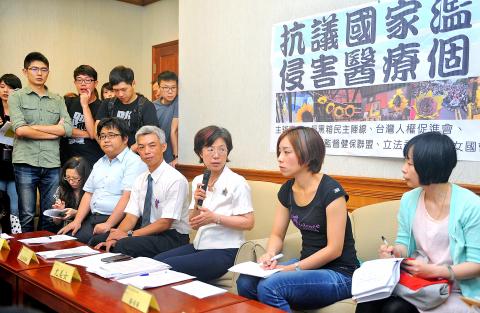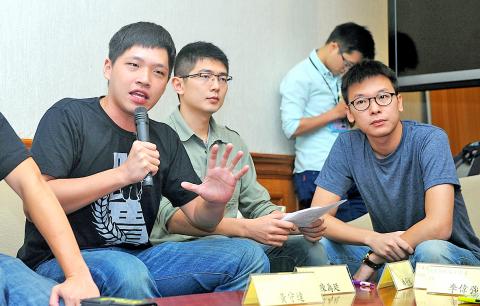Lawyers, student leaders and a legislator yesterday accused law-enforcement agencies, including prosecutors and the police, of abusing their powers and intimidation for summoning and questioning hundreds of Sunflower movement participants since the movement’s protests ended on April 10.
More than 400 people have been questioned or investigated by the prosecutors and the police, who obtained the protesters’ personal and medical information — sometimes illegally — since the three-week-long occupation of the Legislative Yuan’s main chamber, they said.
“There are people who were simply sitting outside the Executive Yuan [during the storming] being investigated, and some students have been summoned for questioning just because they left their contact numbers when accompanying their friends to a hospital,” Democratic Front Against Cross-strait Trade in Services Agreement convener Lai Chung-chiang (賴中強) told a press conference at the Legislative Yuan.

Photo: Liao Chen-huei, Taipei Times
Lee Chun-ta (李俊達), a representative from the student group Democracy Tautin, and Black Island Nation Youth Front spokesperson Huang Yu-Fen (黃郁芬) criticized Taipei hospitals for providing visit records to authorities. They accused the hospitals of flouting medical ethics and said that the hospitals had become the authorities’ stooges.
“Hospitals are supposed to be a place where lives are saved and injuries attended to, but now they have become the abettor of the authorities’ persecution as people are being hunted down by the state power for visiting a medical facility,” Huang said.
However, Lee Wui-chiang (李偉強), head of the Ministry of Health and Welfare’s Department of Medical Affairs, denied that hospitals had turned over personal information about patients to the police, adding that the ministry had confirmed and reconfirmed with hospital officials that such details had not been given out.

Photo: Liao Chen-huei, Taipei Times
Democratic Progressive Party Legislator Yu Mei-nu (尤美女) said she wanted to know why, “if the police could identify participants involved in the movement so easily, without help from the hospitals, those police officers who wielded batons against protesters have been so difficult to find?”
A National Fire Agency official said the Taipei City Fire Department did hand over information on 36 people, out of the 42 requests that it received from the Taipei City Police Department.
“They were all processed as confidential documents,” he said.
Attorney Liu Chi-wei (劉繼蔚) said the Emergency Medical Services Act (緊急救護法) prohibits the disclosure, without permission, of “information, known or held from performing … duties.”
“Officials have not been held politically accountable for the state violence committed, while people are now intimidated by the state power… The laws are simply tools and toys for the Chinese Nationalist Party [KMT] government to play with,” said Dennis Wei (魏揚), a key figure in the Sunflower movement.
Lin Fei-fan (林飛帆), another student leader, said prosecutors are going beyond the call of duty as part of the government’s intimidation measures against those who “dare to express their dissent against the establishment.”
Student leader Chen Wei-ting (陳為廷) questioned the need to interrogate hundreds of people when the main actors of the movement have already, on their own initiative, offered to help prosecutors and police clarify what occurred during the protests.
“President Ma Ying-jeou (馬英九) said on June 4, commemorating the Tiananmen Square Massacre, that he hopes ‘democracy and rule of law could one day become the common language of the two sides of the [Taiwan] Strait.’ Ma is truly working toward that goal, since now we are getting closer to China’s standard [of repression],” Chen said.

SECURITY: As China is ‘reshaping’ Hong Kong’s population, Taiwan must raise the eligibility threshold for applications from Hong Kongers, Chiu Chui-cheng said When Hong Kong and Macau citizens apply for residency in Taiwan, it would be under a new category that includes a “national security observation period,” Mainland Affairs Council (MAC) Minister Chiu Chui-cheng (邱垂正) said yesterday. President William Lai (賴清德) on March 13 announced 17 strategies to counter China’s aggression toward Taiwan, including incorporating national security considerations into the review process for residency applications from Hong Kong and Macau citizens. The situation in Hong Kong is constantly changing, Chiu said to media yesterday on the sidelines of the Taipei Technology Run hosted by the Taipei Neihu Technology Park Development Association. With

CARROT AND STICK: While unrelenting in its military threats, China attracted nearly 40,000 Taiwanese to over 400 business events last year Nearly 40,000 Taiwanese last year joined industry events in China, such as conferences and trade fairs, supported by the Chinese government, a study showed yesterday, as Beijing ramps up a charm offensive toward Taipei alongside military pressure. China has long taken a carrot-and-stick approach to Taiwan, threatening it with the prospect of military action while reaching out to those it believes are amenable to Beijing’s point of view. Taiwanese security officials are wary of what they see as Beijing’s influence campaigns to sway public opinion after Taipei and Beijing gradually resumed travel links halted by the COVID-19 pandemic, but the scale of

A US Marine Corps regiment equipped with Naval Strike Missiles (NSM) is set to participate in the upcoming Balikatan 25 exercise in the Luzon Strait, marking the system’s first-ever deployment in the Philippines. US and Philippine officials have separately confirmed that the Navy Marine Expeditionary Ship Interdiction System (NMESIS) — the mobile launch platform for the Naval Strike Missile — would take part in the joint exercise. The missiles are being deployed to “a strategic first island chain chokepoint” in the waters between Taiwan proper and the Philippines, US-based Naval News reported. “The Luzon Strait and Bashi Channel represent a critical access

Pope Francis is be laid to rest on Saturday after lying in state for three days in St Peter’s Basilica, where the faithful are expected to flock to pay their respects to history’s first Latin American pontiff. The cardinals met yesterday in the Vatican’s synod hall to chart the next steps before a conclave begins to choose Francis’ successor, as condolences poured in from around the world. According to current norms, the conclave must begin between May 5 and 10. The cardinals set the funeral for Saturday at 10am in St Peter’s Square, to be celebrated by the dean of the College